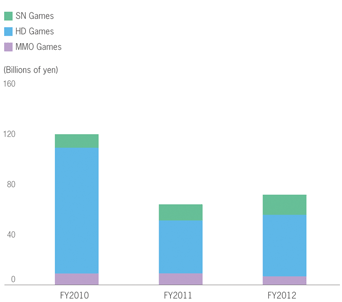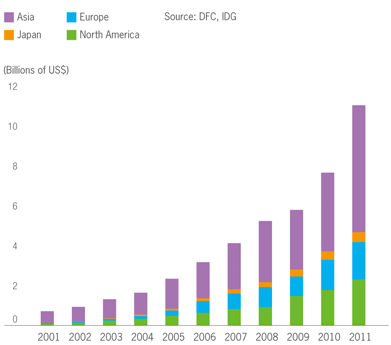Changes in the Undercurrent of the Digital Entertainment Business
The Digital Entertainment business is a broad segment that covers all types of devices and all genres of games. We group this segment broadly because it is impossible to find appropriate classifications in this time of transition for the industry. In other words, even if we create some classifications for this segment, those classifications may rapidly change, and we cannot guarantee the consistency of a segment within our reporting.
However, I would like to show you a breakdown of the segment in more detail to promote understanding of our business performance. Therefore, I will divide this segment into three categories for convenience’s sake (Figure 2): MMO games (Massively Multiplayer Online games), SN games (Social Networking and mobile games), and HD games (High-Definition games). These categories are how we organize internally rather than classifications about markets or business models.
Figure2: Net Sales Digital Entertainment Segment

I have long expected MMO games to provide a stable source of profit.
“FINAL FANTASY XI” has been continuing services for ten years since its launch, and even if we consider all the server, operational staffing, and maintenance costs in addition to the development costs, the accumulated operating profit generated by the title is close to 40 billion yen. As a single title, “FINAL FANTASY XI” has had the highest level of contribution to our profits. If successful, MMO is a genre where we can achieve very high profitability. Also, the MMO game market itself has been growing at a regular pace (Figure 3). At the same time, development of MMOs is challenging, requiring large initial investments and deployment of sizable support teams. MMOs have an extremely high barrier to entry. Thus, our strategy is to win the fierce battle among a small number of competitors, creating a supporting rock for the Company’s profit.
To raise our chances for success, we adopted tactics that concentrated our efforts on our most powerful IPs, FINAL FANTASY and DRAGON QUEST, and we did not pursue other MMO projects before the success of these two titles was ensured. More concretely, “FINAL FANTASY XI” was to be continued for as long as possible; “FINAL FANTASY XIV” was to be launched in 2010 in Japan, North America, and Europe, and then in China from 2011; and “DRAGON QUEST X,” a DRAGON QUEST MMO, was planned for launch in 2012 in Japan. However, we stumbled at the launch of “FINAL FANTASY XIV.” Not only was the FINAL FANTASY brand damaged, but the Company’s profit planning was undermined, and deployment of development staff was also affected. This was a challenging time for the Company, but I stood fast that we should not change our original plan. In order to revive the FINAL FANTASY brand and to regain trust in the MMO market, we chose not to shut down “FINAL FANTASY XIV.” We are treading the thorny path of continuously improving the existing service while simultaneously working to renovate the game fundamentally. Due to the initial stumble, most players had left the game during the first six months, but more than a year later, in early 2012, we began charging for the game, and we realized that the game had regained more trust from our players than we had expected. The number of players has increased since we began charging. We have successfully brought the game back on track. “FINAL FANTASY XIV” is eyeing a full comeback with the release of its fundamentally revamped version between 2012 and 2013. I am confident that the title will be one of the main profit generators for us. Furthermore, the development of “DRAGON QUEST X” is proceeding smoothly toward its 2012 launch.
While taking two years longer than we originally planned, this fiscal year we finally completed the work of correcting the path of our business in the MMO category. I believe that we have been able to demonstrate our strong commitment to the brand, as well as the ability to take action in order to overcome difficulties. By the fiscal year ending March 31, 2013, these MMO games will provide more revenues and in the fiscal year ending March 31, 2014, further contribute to our profit.
Figure3: MMO Game Market Size

